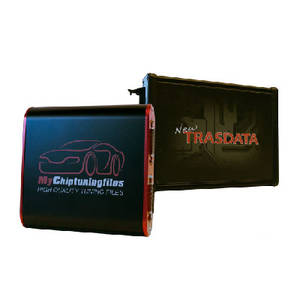Monday 21 October

So, you’ve probably heard people talking about car remapping before, right? Maybe one of your friends went on about how much faster his car feels now, or maybe you've seen posts online about how it’s the "best mod" you can do to get more power out of your car without spending loads of money. But what exactly is remapping? And, more importantly, is it really worth it? Like, are there any downsides you should know about before you go ahead and get it done?
Car remapping (or chip tuning) basically means adjusting the settings on your car's Engine Control Unit (ECU) to change how the engine performs. It’s kinda like giving your car a software update but one that changes how it drives. Manufacturers typically set the ECU to a balanced, middle-of-the-road tune that works for everyone (but maybe not for you if you want something more exciting or fuel efficient). By remapping, you can unlock more power, improve fuel economy, or even make the car’s throttle feel more responsive. Cool, right?
But... It’s not all roses. There are definitely some risks involved too, and it’s important to know what you’re getting into before you start playing around with your car’s brain.
Let’s dive into it, shall we?
The Benefits of Car Remapping
Let's start with the good stuff. Why would you even bother with a remap in the first place?
1. More Power and Torque
Yeah, this is the big one. Most people get a remap to make their car faster. After a remap, you’ll likely see a significant increase in power (depending on your car). It could be as much as 20-30% more power if you have a turbocharged engine, which is a lot. Naturally aspirated engines get less of a boost, but still, you’re gonna feel a difference for sure.
And it's not just about horsepower. A remap can also give you more torque, which means better acceleration and more pulling power at lower RPMs. This is great for overtaking or just making your car feel more lively when you're driving around town.
2. Better Fuel Economy (Sometimes)
This one might sound too good to be true: more power and better fuel efficiency? Well, it’s actually possible with certain remaps. Manufacturers usually set the engine up to run conservatively for emissions and reliability reasons. A good remap can optimize the air-fuel ratio to be more efficient at certain speeds or under light load, which might save you a bit of fuel.
But, let’s be real for a sec. If you’re using that extra power all the time, gunning it down the highway every chance you get, your fuel consumption is probably gonna go up, not down.
3. Smoother Power Delivery
Another cool thing about remapping is that it can make your car feel smoother and more responsive. You know how sometimes when you press the gas, there’s a slight delay before the car really gets going? A remap can often fix that, making the throttle more sensitive and giving you a quicker response.
For everyday driving, this can make your car feel a lot nicer to drive. It's less jerky and more in tune with what your foot is doing on the pedal.
4. Improved Towing Performance
If you’re into towing (boats, trailers, caravans, etc.), remapping can make a big difference here too. The extra torque from a remap helps the engine pull heavier loads more easily, especially if you’ve got a turbo-diesel engine. It’ll just feel like the engine is working less hard to get the job done.
5. Tailored to Your Needs
One thing a lot of people don’t realize is that remapping isn’t a one-size-fits-all kind of deal. A good tuner can customize the remap to suit exactly what you want. Want more power but still care about fuel economy? No problem. Want an aggressive, track-ready tune? You got it. There’s a lot of flexibility depending on your goals and how you drive.
ALSO READ: Turbocharging vs. Supercharging: Which Tuning Method is Best for Your Car?
The Risks of Car Remapping
But, and here’s the thing, remapping isn’t without its downsides. Let’s go over some of the risks before you jump in headfirst.
1. Increased Wear and Tear on the Engine
More power is great, but it also means your engine is working harder. Remapping puts more stress on various components like the pistons, turbocharger, transmission, and so on. If your engine wasn’t designed for that level of performance, it could wear out faster than it otherwise would.
This doesn’t mean your engine will explode (hopefully), but you might start noticing more wear and tear, especially if you’re always pushing it to its limits. Maintenance becomes even more critical after a remap—regular oil changes, making sure the coolant system is up to the task, etc.
2. Goodbye, Warranty
Yeah, one big downside: remapping can void your car’s warranty. Most manufacturers aren’t super happy when you mess with their factory settings, and if something breaks, they’ll probably blame the remap. So, if your car is still under warranty, remapping is a bit of a gamble. You’re on your own for repairs if anything goes wrong.
3. Insurance Could Get Tricky
Technically, you’re supposed to tell your insurance company if you remap your car. It’s considered a modification, and if you don’t declare it, they might refuse to pay out in the event of an accident. Problem is, insurance companies don’t really like performance mods, and your premiums could go up a lot depending on how much extra power the remap gives you.
Some people take the risk and don’t tell their insurer (not that I’m advising that), but it’s definitely something to think about. A big accident could leave you seriously out of pocket if your insurance finds out you’ve been hiding a remap.
4. Not All Engines Are Good Candidates
Here’s a less obvious risk: not every car or engine is a good fit for remapping. Some older engines might not benefit much, or you could run into compatibility issues that cause reliability problems. And if you have a non-turbo engine, the power gains might be pretty underwhelming.
If you don’t go to a reputable tuner, there’s also the risk that they’ll mess up the remap, which could cause even more problems down the line. Always go to someone who knows what they’re doing and who’s familiar with your specific car and engine.
5. More Emissions (Not Exactly Eco-Friendly)
In some cases, remapping might make your car produce more emissions. By making the engine run hotter or more powerfully, you could end up increasing the amount of pollutants your car puts out. If you live somewhere with strict emissions laws, that could become a problem, especially during inspections.
Some remaps still stay within legal emissions limits, but it’s something to keep in mind if being eco-friendly or keeping things street-legal is important to you.
So, Should You Remap Your Car?
Here’s the thing—remapping is awesome if you’re looking for more power and you’re okay with a few trade-offs. If you’re someone who loves driving fast, enjoys modifying your car, and doesn’t mind keeping up with the extra maintenance or possible insurance complications, remapping could be a great option for you.
However, if you’re driving a relatively new car that’s still under warranty, or you’re not super comfortable with the idea of putting extra strain on your engine, then maybe it’s not worth the risk. Sure, more power is fun, but not if it ends up costing you a fortune in repairs.
ALSO READ: The Ultimate Guide to ECU Programming: Tools, Software, and Services
Final Thoughts on Remapping
At the end of the day, remapping is one of those mods that can give you a lot of bang for your buck—if it’s done right. More power, better throttle response, maybe even improved fuel efficiency (if you drive conservatively), all sound great. But remember, there are risks involved. It’s not just plug-and-play.
Make sure you’re working with a reputable tuner who knows what they’re doing, and be honest with yourself about what you’re looking for. And don’t forget about the insurance! Nobody wants to get caught out in an accident with a modded car that wasn’t declared.
news.related_news
Chiptuning tools
Whether you own a car, truck or tractor: we have the best equipment and software for tuning your petrol and diesel engine. With our chiptuning tools it is possible to easily read out the original engine software of your vehicle and upload it to our website. And then it's up to us to provide you with high-quality and customized chip tuning files. Curious about our range of chiptuning tools? Check it out via the button below!










